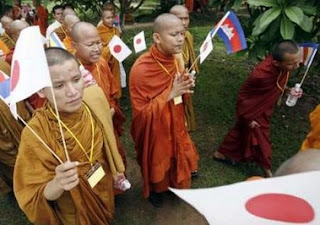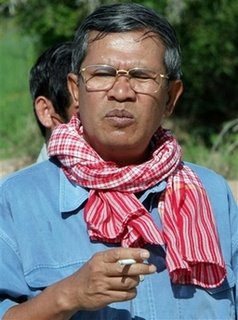FOR IMMEDIATE RELEASE
AS-108-2007
May 28, 2007A Statement by the Asian Human Rights CommissionCAMBODIA: Code of ethics for judges will not be effective without compliance mechanisms
The Supreme Council of the Magistracy (SCM) of Cambodia, the supreme judicial body governing the judiciary, should be commended for having recently adopted a code of ethics for judges. The adoption of this code is a significant development in the protracted legal and judicial reform programme undertaken by the Cambodian government. If effectively enforced and well complied with, this code could become a remedy to the pandemic corruption within the judiciary and other branches of government. It will strengthen the independence of the judiciary, inspire more public confidence in it, and lay a solid foundation for the rule of law in the country.
The code begins with the objective of reinforcing the dignity and independence of all judges. It then successively announces the principles of independence, impartiality, honesty, dignity and diligence, and the application of each of these principles. The Cambodian code reflects much of the Bangalore Principles of Judicial Conduct and similar codes in countries endowed with a well functioning, independent judiciary, although it does not contain much detailed and elaborated application of or commentary on each of those principles.
Due to these shortcomings, the principles and their respective application are very open to various interpretations that may render their enforcement less effective. For instance, regarding judges' attitudes towards political activities and issues, the Cambodian code says, under the principle of independence, that judges “shall remain neutral in political activities”; and under the principle of impartiality, that they “shall not make and prejudgment relating to ...political tendency...” when making judgments, and that they “should avoid making any statement ...relating to political controversies; involving political parties; ..” It does not specify, as some other codes do, that judges should refrain from membership in or association with political organisations or activities. A clear recommendation in this regard would put an end to the political control of judges through their affiliation to the ruling party since the communist days, or their more recent politically-encouraged affiliation. The issue of party affiliation, political control and the effectiveness of the enforcement of the code will be looked at in more detail below.
Alongside these shortcomings, the Cambodian code, however, confirms the independence of the prosecution as stipulated in the country's constitution, in which it is recognised that prosecutors belong to the same body of judges. It further incorporates the inadmissibility in court of evidence obtained through the use of illegal means and the prosecution of those who have resorted to those means, which is a novelty under the Cambodian legal system and which is left to the law of evidence and the law on the crime of torture in other countries. Section 9 of the Cambodian code says that “when a judge receives evidence against a suspect, and that evidence is known or believed to derive from illegal means which seriously violate the rights of the suspect, especially when it relates to torture or inhuman treatment, or any human rights violation, that evidence shall not be permitted to be used against the suspect, and the judge shall take necessary measures to ensure that the persons responsible for the above acts are immediately brought before the court.”
The Asian Human Rights Commission (AHRC) is very much concerned that this code will encounter the same fate as that of other laws in Cambodia, whose implementation is weak and depends on the erratic “political will” of the country's leadership, instead of depending on the institutions of the rule of law, which, in the country, are primarily dysfunctional. This code will not be effective without the SCM recognising the need for it to reorganise in order to become an independent body, which is free of political control, and in which a set of transparent and fair enforcement mechanisms are put in place.
Under the Cambodian constitution, the SCM provides assistance to the king, who is also its chairman, to guarantee the independence of the judiciary. Under the law on its organization and functioning, the SCM is responsible for the discipline of judges and the effective functioning of all courts of law. It has a disciplinary council specifically for this purpose, and is therefore the body that is responsible for the implementation and enforcement of the code.
However, as seven of its nine members are themselves judges and prosecutors, the SCM is unlikely to be effective in the enforcement of the code. As a result, these members may not be very forthright in disciplining their peers, especially as almost all of these seven members and their peers belong to the same ruling party, the Cambodian People's Party or CPP. Three of the seven members are openly known to be active members of the CPP. One member is the president of the Supreme Court and a member of the standing committee and central committee of the CPP. Another member is the president of the Court of Appeals and is also member of the CPP, known to be actively participating in the party's activities. It is very difficult for these two leading judges to maintain and proclaim their neutrality in political activities. Another SCM member is the minister of justice who runs and controls the SCM secretariat. He is also an active member of the party.
Because of its composition, its members' political affiliation and the control of its secretariat by the minister of justice, a politician, the SCM is not itself free from political control and is not in a good position to ensure judges' neutrality with regard to political activities, as the code has stipulated. In the past, it has not proved itself as being effective in disciplining judges for misconduct. For instance, in 2004, it did not act upon a request by the Ministry of the Interior to investigate the corruption of certain judges. This inaction created a confrontation with the ministry in question. Prime Minister Hun Sen stepped in then with his “iron fist” policy which was allegedly aimed at stamping out corruption from the judiciary, but which instead had the effect of consolidating his control of the judiciary. The SCM then brought to justice a number of judges only to allow them to resume their normal judicial functions when the “iron fist” policy had lost its thrust and petered out.
The SCM now has a code that can serve as the basis for the enforcement of discipline upon judges and ensure their independence, impartiality, honesty, dignity and diligence. However, it does not as yet have any transparent and fair complaint procedures in place. Its decisions on discipline have, so far, not been known to be free of bias, and judges that have been disciplined, have not been able to challenge decisions, which cannot be the subject of an appeal. Furthermore, it is widely known that members of its discipline council are not themselves free from corruption, as accused judges can bribe them to have the charges against them dropped.
The first step would be for the SCM to reorganise itself to become a body that is independent and free from political control. Its members should have no affiliation to any political party, and at least half of them should be non-members of the judiciary. It should run and control its own secretariat. Its members should comply with the code - especially, its principles of independence, impartiality and honesty - and serve as models for all members of the judiciary.
The SCM should now widely disseminate the code and encourage the public to report any misconduct by judges. It should enact by-laws on the complaint procedure, clearly distinguishing complaints against judges' decisions, which are under the jurisdiction of the Courts of Appeals or the Supreme Court, and complaints against judges' conduct, which fall under its jurisdiction. These by-laws should set out in detail who can make complaints against judges, how such complaints can be made, where they should be sent, and when they can be acknowledged and their outcome notified to the complainant. They should detail the process by which complaints are dealt with, how they will be examined, how inquiries are conducted, how accused judges can defend themselves, and how sanctions are decided. They also need to determine the range of sanctions available, which should be proportionate to the seriousness of the proven misconduct. All of these complaint procedures should be transparent and fair, and made known to all members of the judiciary, the legal profession and the wider public. The SCM should assign a leading judge in each court to act as ethics officer for other judges to consult on ethical issues they may be encountering in and out of court.
The implementation of the code would be greatly facilitated and made more effective if judicial ethics is made an important course in the training programme for judges and lawyers at both the Royal Academy of Judicial Profession and the Centre for Lawyers Training and Professional Improvement in Phnom Penh. The Ministry of Justice and the SCM should also include judicial ethics as an important topic in all refreshment training seminars for judges that they are organising.
The AHRC urges the SCM and the Ministry of Justice of Cambodia to effectively enforce the newly adopted code of ethics for judges through the reorganisation of the SCM so that it can become a truly independent body, free of political control and corruption. It is vital for them to ensure the setting up of transparent and fair complaint mechanisms, the wide dissemination of the code, the training in judicial ethics for judges and lawyers, and encouragement for members of the public to make complaints, as proposed above. The AHRC also urges donors and expert organisations, especially countries sponsoring the legal and judicial reform programme in Cambodia, to work with these two Cambodian institutions for the effective enforcement of and compliance with this code of ethics.
# # #
About AHRC: The Asian Human Rights Commission is a regional non-governmental organisation monitoring and lobbying human rights issues in Asia. The Hong Kong-based group was founded in 1984.









































